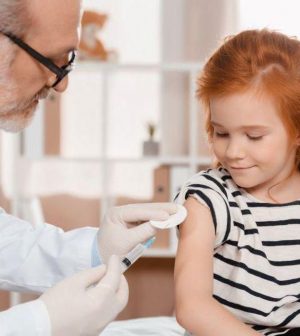- Could Artificial Sweeteners Be Aging the Brain Faster?
- Techniques for Soothing Your Nervous System
- Does the Water in Your House Smell Funny? Here’s Why
- Can a Daily Dose of Apple Cider Vinegar Actually Aid Weight Loss?
- 6 Health Beverages That Can Actually Spike Your Blood Sugar
- Treatment Options for Social Anxiety Disorder
- Understanding the Connection Between Anxiety and Depression
- How Daily Prunes Can Influence Cholesterol and Inflammation
- When to Take B12 for Better Absorption and Energy
- Epsom Salts: Health Benefits and Uses
COVID Vaccine Safe for Kids Who’ve Had MIS-C, Small Study Suggests

COVID-19 vaccines appear to be safe for kids who have had a rare complication called MIS-C after being infected by the coronavirus, according to a new small study.
Some kids get MIS-C — shorthand for multisystem inflammatory syndrome in children — four to six weeks after a bout with COVID. Many have few or no COVID symptoms, but then develop symptoms of MIS-C, which include fever, abdominal upset, rash and red eyes.
While MIS-C can be fatal, it is treatable with steroids or immune-globulin infusion if diagnosed early.
“Because so little is known about the causes of MIS-C in children previously infected with COVID, many health care providers and parents feared that children with a history of MIS-C may redevelop MIS-C or a similar inflammatory problem from the vaccination,” study senior author Dr. Tiphanie Vogel said in a news release from Baylor College of Medicine in Houston.
“But our multidisciplinary approach to studying this concern led us to recommend that those patients with a history of MIS-C still get vaccinated to protect themselves from reinfection,” said Vogel. She’s an assistant professor of pediatrics at the medical school and a researcher at the affiliated Texas Children’s Hospital.
This study included 15 youths, ages 12 to 18, who recovered from MIS-C and received the Pfizer vaccine at least 90 days after their diagnosis of MIS-C. They were followed for 9.5 months after vaccination.
All participants tolerated the vaccine with only mild side effects similar to those seen in the general population, the study found.
The findings were published March 28 in JAMA Network Open.
Researchers are continuing to follow children in the study, as well as a group of those under 12 years of age who received the COVID-19 vaccine after recovering from MIS-C.
The study researchers received funding from Pfizer, a COVID vaccine manufacturer, and Gilead, developer of an antiviral treatment for the disease.
More information
There’s more on MIS-C at the U.S. Centers for Disease Control and Prevention.
SOURCE: Baylor College of Medicine, news release, March 28, 2022
Source: HealthDay
Copyright © 2026 HealthDay. All rights reserved.










